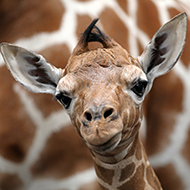
Calf named Margaret in honour of the first person to receive COVID-19 vaccination.
Keepers at ZSL Whipsnade Zoo are celebrating the arrival of a six-foot-tall baby giraffe, named Margaret in honour of the first person to receive the COVID-19 vaccination.
Born in the early hours of Tuesday (8 December), the female calf arrived into the world as 90-year-old Margaret Keenan rolled up her sleeve to receive the first Pfizer/BioNTech jab.
The Zoo said the birth adds yet more meaning to that 'day of hope', as it provides a positive boost for the population of the species, which is officially classified as Endangered in the wild.
Team Leader Mark Holden said: “2020 has been a challenging year for the world, and the arrival of our precious giraffe calf on the same day – and actually at the same time! - as the much-anticipated COVID-19 vaccination was first administered feels like a real moment of hope – and one we are so keen to celebrate and remember.
“Here at ZSL Whipsnade Zoo we have keenly felt the pressures caused by the COVID-19 pandemic, we and our sister site ZSL London Zoo, were forced to close for a total of 16 weeks each, putting huge financial strain on our charity and our global conservation efforts.”
Margaret is a reticulated giraffe, born as part of the international conservation breeding programme (EEP) for the species.
Zookeepers kept a close eye on mum Luna throughout her pregnancy and prepared a deep layer of bedding when they knew birth was imminent. The rest of the herd waited close by to provide reassurance and support to mum.
Less than an hour after her birth, Margaret was already taking her first few wobbly steps. She is said to be suckling well from Luna, who has continued to take motherhood in her stride.
Mark Holden continued: “Just as the first vaccine has given people across the UK new hope, our new arrival brings new hope for this endangered species. With fewer than 9,000 individuals living in the wild, this little one’s arrival is a vital boost to the numbers of this Endangered species.”
“We very much hope that Margaret Keenan, will be able to come in and visit her namesake one day soon, so we can introduce them in person!”
Image (C) ZSL Whipsnade Zoo.



 The Veterinary Medicines Directorate (VMD) is inviting applications from veterinary students to attend a one-week extramural studies (EMS) placement in July 2026.
The Veterinary Medicines Directorate (VMD) is inviting applications from veterinary students to attend a one-week extramural studies (EMS) placement in July 2026.